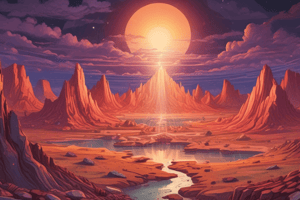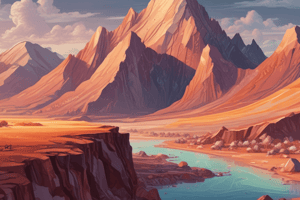Podcast
Questions and Answers
Match the following geological phenomena with their descriptions:
Match the following geological phenomena with their descriptions:
Plate tectonics = Movement of Earth's lithospheric plates Earthquakes = Release of energy along fault lines Volcanoes = Openings in the Earth's crust for magma and gases Geological time scale = Chronological framework for Earth's history
Match the following types of rocks with their corresponding processes in the rock cycle:
Match the following types of rocks with their corresponding processes in the rock cycle:
Igneous = Formed from cooled and solidified magma Sedimentary = Formed from accumulation of sediments Metamorphic = Transformed from existing rocks under heat and pressure Sedimentary rocks = Study in sedimentary petrology
Match the minerals with their key properties:
Match the minerals with their key properties:
Quartz = Hardness of 7 on the Mohs scale Feldspar = Common mineral in granite Calcite = Effervesces with acid Mica = Splits into thin sheets
Match the following geological fields with their focus areas:
Match the following geological fields with their focus areas:
Match the geological events with their outcomes:
Match the geological events with their outcomes:
Flashcards
Geology
Geology
The study of Earth's composition, structure, processes, and history.
Plate Tectonics
Plate Tectonics
The movement of Earth's lithospheric plates.
Rock Cycle
Rock Cycle
Processes changing rocks between igneous, sedimentary, and metamorphic types.
Minerals
Minerals
Signup and view all the flashcards
Geological Time Scale
Geological Time Scale
Signup and view all the flashcards
Earthquakes
Earthquakes
Signup and view all the flashcards
Volcanoes
Volcanoes
Signup and view all the flashcards
Palaeontology
Palaeontology
Signup and view all the flashcards
Structural Geology
Structural Geology
Signup and view all the flashcards
Engineering Geology
Engineering Geology
Signup and view all the flashcards
Sedimentary Petrology
Sedimentary Petrology
Signup and view all the flashcards
Metamorphic Petrology
Metamorphic Petrology
Signup and view all the flashcards
Study Notes
Geology Study Notes
- Geology is the study of the Earth, including its composition, structure, processes, and history.
- Plate tectonics describes the movement of Earth's lithospheric plates.
- The rock cycle outlines the processes that transform rocks from one type to another (igneous, sedimentary, and metamorphic).
- Minerals are naturally occurring, inorganic solids with a specific chemical composition and crystal structure, having unique properties.
- The geological time scale provides a chronological framework for Earth's history.
- Earthquakes result from the release of energy along fault lines.
- Volcanoes are openings in the Earth's crust through which molten rock (magma), ash, and gases erupt.
- Palaeontology studies fossils to understand past life forms.
- Structural geology examines the deformation and structures found within rocks.
- Engineering geology applies geological principles to engineering projects.
- Sedimentary petrology focuses on the study of sedimentary rocks.
- Metamorphic petrology studies metamorphic rocks.
Studying That Suits You
Use AI to generate personalized quizzes and flashcards to suit your learning preferences.




